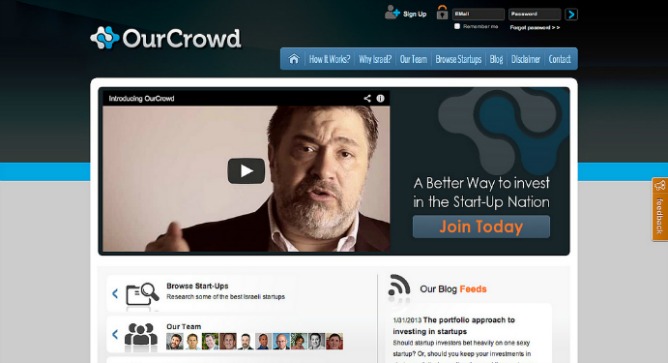Many crowdfunding startups now make it easier for founders to reach a bigger audience of investors. The question is whether investors are as keen to continue funding crowdfunding sites.
OurCrowd may find out soon. The two-and-a-half-year-old, Jerusalem-based hybrid platform enables accredited investors to back startups through its site, as well as makes direct investments in each of those companies. In the meantime, it’s thinking about its own, next funding round.
To learn the latest about the company, which raised $25 million in Series B funding from undisclosed investors last year, we talked yesterday with founder and CEO (and longtime VC) Jon Medved.
TC: OurCrowd has brand recognition in the U.S., but I’m not sure people understand how it differs from other crowd-funding platforms.
JM: Honestly, ten years ago, the Valley was much less Valley-centric than it is today. The world goes global and is connected on the web, yet the Valley becomes more hyper local than ever. It’s really contrary to all the trends. We can all meet in cyberspace, but if you’re not physically in the Valley, it’s often like, “Who are you?”
TC: Dare I ask if you’ve thought about opening a Bay Area office?
JM: We’re looking to establish a presence in Silicon Valley. We’re actively looking for a managing director [in the Bay Area], someone with rich angel and venture capital experience, if you want to tell your readers.
TC: You sometimes lead deals on your platform, is that correct?
JM: Yes, in fact, we just launched a deal for $25 million that we’re leading. Most people, when they think of crowdfunding, they think of deals that are small, but we’re far ahead of that; we’re doing millions of dollars on average, and in this particular case, we’re investing more than $10 million.
The already profitable company [called Mprest] basically makes software that powers the Iron Dome, which is the Israel-based system that shoots missiles out of the air before they land. In Israel, you have about 15 seconds if someone shoots at you from the Gaza Strip. This system responds within a second, creating instruction sets to intercept whatever has been fired — and it’s now taking its technology into the Internet of Things.
TC: To do what?
JM: To create a different kind of control panel for water networks or smart cities or electrical grids – places where you have ridiculously large centers of input and need real-time response times. In an electrical network, for example, if you don’t cut off a [malfunctioning] transformer, it can get fried, and transformers cost millions of dollars.
TC: Still, that’s an awfully big bet. How much do you typically co-invest alongside the investors on your platform?
JM: We curate both the investors and the deals, which go through a rigorous venture screen. Then we typically [co-invest] with other venture firms, including top firms like Accel Partners and Menlo Ventures. [Ed: Some of the firm’s newest venture-backed bets include Influitive, a 4.5-year-old, Toronto-based company focused on advocate marketing, and CropX, a nearly two-year-old, Tel Aviv and San Francisco-based startup whose sensors and app measure soil moisture and temperature levels.]
At this point, I think we’re the most active investor in Israel. We’ve funded 75 companies since our inception in early 2013, and this year, we’ll invest over $120 million [between what we invest and our investor network chips in].
TC: Where are your investors mostly based?
JM: We have 10,000 investors from 110 countries, and more than half are in the U.S. In terms of deal flow, too, we’re also quite global. Thirty percent of our deals are outside Israel, including almost a dozen U.S. companies.
TC: Do you have anything akin the Syndicate platform on AngelList, to allow your accredited investors to syndicate deals themselves?
JM: We don’t have anything formally structured like Syndicates. Typically, angels [on AngelList] aren’t investing millions of dollars, which is our average deal size. Typically, too, they aren’t on the board. We take board seats. We get preemptive rights. We also invest sums in the second and third round of many of our companies.
Our minimum investment is $10,000 per investor per deal, and our average investor at the moment has chosen about six deals and is investing somewhere near $140,000 [across numerous deals]. This isn’t a platform where people are putting in $2,000 here and there.
TC: Who are these wealthy individuals? I take it they aren’t dentists from Los Gatos.
JM: We’d love to have more angels from Silicon Valley, but we have CEOs and chairmen of major corporations and even many billionaires. I was sitting with one last week who said, “I’m a billionaire but I don’t get invited into Silicon Valley deals because my business is too boring.” There are a lot of smart people who are either new to investing or just not active in the angel communities you might think about.
TC: Have any exits yet?
JM: We’ve had two so far: One IPO with ReWalk Robotics [a company that produces the ReWalk exoskeleton, a device that enables people with spinal cord injuries to sit, stand and walk]. That produced a double-digit return, which took less than a year. Our other company was NextPeer, [a mobile game developer platform] that exited in a trade sale. [Ed: It sold to Viber last month.]
TC: And how do you get paid?
JM: We take management fees on the investment up front – 2 percent for four years, which we take up front, though we’ll return the unused fees if a company exits early. We take another 4 percent [of the capital raised for a deal] for administrative expenses. And we charge 20 percent of carried interest.
TC: You’re putting a lot of money to work in the meantime. Presumably you’re looking to raise your next round.
JM: We’ve raised more than $30 million for the platform across two rounds and my guess is that we’d hopefully, not too long in the future, be raising additional funds.
